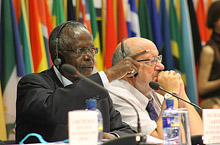ACP-EU parliament first joint body to tackle relations after 2020
 Paramaribo, Suriname, 2 December 2012/ ACP: Parliamentarians from EU and ACP countries have called for deeper debates on relations between the two major blocs, with the Cotonou Accord up for final review in 2015, before closing in 2020.
Paramaribo, Suriname, 2 December 2012/ ACP: Parliamentarians from EU and ACP countries have called for deeper debates on relations between the two major blocs, with the Cotonou Accord up for final review in 2015, before closing in 2020.
In a declaration released at the 24th session of the ACP-EU Joint Parliamentary Assembly in Suriname last week, Co-Chairs Hon. Musikari Kombo (Kenya) and Hon. Louis Michel (Belgium) urged fellow MPs to try and pinpoint the interests of both the ACP and the EU, so as to “intensify their partnership beyond 2020.”
Recently, ACP representatives in Brussels have voiced concerns over the “possible downgrading” of the ACP-EU cooperation framework on the EU agenda, with key developments such as the fracturing of the ACP Group into different regions under the European External Action Service programme.
But at the Joint Assembly, MEP Ricardo Cortes Lastra called the ACP-EU accord a “success story”: “It is obvious that the partnership between ACP and EU countries must continue. It is still very much a living partnership… but should be clarified by more inter-relations and more union,” he said.
MEP Michael Gahler said it was “embarrassing” if the Cotonou Agreement was not continued, calling for a working group on the issue to be set up, and to involve national parliaments more strongly in the debate.
MEP Mariya Gabriel highlighted the unique joint framework of the ACP-EU partnership, and insisted that a study be carried out to point out its added value, and the challenges it may face in the future.
Mali MP Assarid Ag Imbarcawane argued that bilaterial talks between the EU and individual ACP states or regions should not weaken the collective nature of the Cotonou Agreement.
The Co-Presidents’ statement was optimistic.
“The ACP Group forms a solid block that should explore its collective strengths in order to play a meaningful role in view of the global challenges and the new opportunities opened up by the emerging economies,” their joint declaration stated.
It added that the follow up on the Rio+20 Conference, the post-2015 development agenda or the Doha Development talks were opportunities for ACP and EU to act as partners for their common interests.
However, MEP Christian Freda warned that not much progress can be made in speculating the future until the EU Council finalises budget decisions for the multi billion euro European Development Fund (EDF) which supports development projects in the ACP regions. The issue is being debated hotly in Brussels, as the EU Council has proposed wide-ranging cuts – including to the EDF.
Moreover, the majority of both ACP and EU partner countries have not ratified the 2010 revision of the Cotonou Agreement.
Delegates from the European Commission attending at the Joint Assembly sessions, including DEVCO Director Klaus Rudischhauser welcomed the talks, but stressed that the Commission did not have a “pre-determined” position on the issue.
The Cotonou Partnership Agreement was signed in 2000 to replace similar agreements between EU and African, Caribbean and Pacific countries in force since 1975. It provides a framework for cooperation in terms of trade, development finance and political dialogue between the parties.
(Photo: Co-Presidents of the ACP-EU Joint Parliamentary Assembly Hon. Musikari Kombo and Hon. Louis Michel in Paramaribo, Suriname)
– ACP Press
